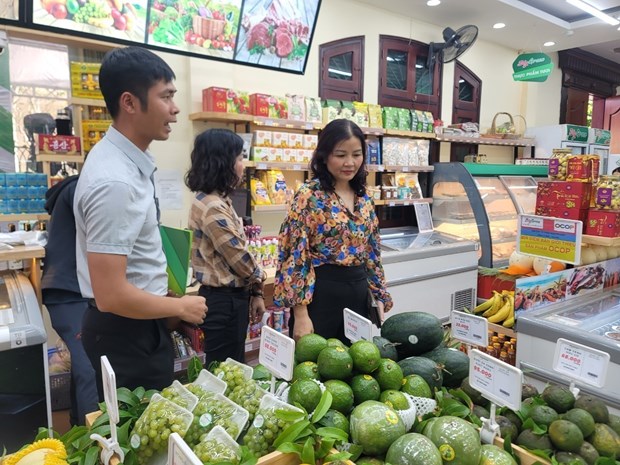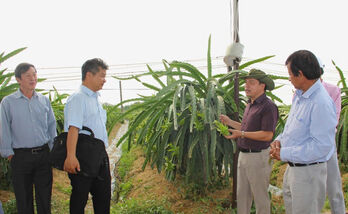 The new OCOP showroom in Dinh Cong ward of Hanoi's Hoang Mai district (Photo: VNA)
The new OCOP showroom in Dinh Cong ward of Hanoi's Hoang Mai district (Photo: VNA)
Addressing a ceremony unveiling a showroom in Dinh Cong ward of Hoang Mai district on October 14, Acting Director of the municipal Department of Industry and Trade Tran Thi Phuong Lan said with OCOP agricultural, food, and specialty products on display and sale, the store will be a trustworthy place for consumers.
OCOP showrooms also create opportunities for producers to advertise their products and boost sales, she noted.
The same day, the department kicked off a week of OCOP products at the BigC Thang Long shopping centre in Cau Giay district. The event, lasting through October 18, features 60 booths of more than 40 businesses and OCOP producers of Hanoi and over 10 other localities.
Meanwhile, another OCOP showroom was opened in Hong Van commune of Thuong Tin district on October 15.
In his remarks, Deputy Director of the Department of Industry and Trade Nguyen The Hiep noted the OCOP programme demonstrates the Party and State’s attention to people’s business activities, especially in rural areas. Through this programme, producers have a chance to improve safe and sustainable production skills so as to capitalise on their advantages and improve product quality, value and packaging.
The development of such showrooms aims to further introduce OCOP products with high quality to consumers and also promote connectivity in production and sale among stakeholders, he added.
Bui Cong Than, Vice Chairman of the Thuong Tin People’s Committee, said the district is one of the best performers in Hanoi in the OCOP programme when 152 of its products have been rated under this programme while hundreds of others are being improved to meet OCOP standards.
Also on October 15, the municipal Department of Industry and Trade launched a showroom in Bich Hoa commune of Thanh Oai district, which has long been renowned for such specialties as the Boi Khe and Bo Nau rice, Kim Duong orange, Uoc Le pork pies, Cu Da soybean jam, and Chuong village’s conical hats.
Many of local products have been rated three - four stars under the OCOP programme, helping improve their value and make them more popular among consumers and visitors.
Hanoi is taking the lead nationwide in the number of OCOP products, with 1,649 products of 426 businesses, cooperatives, and business households given stars. They include four products rated five stars, 1,098 others rated four stars, and 534 rated three stars. There are 1,071 food products (65% of the total), 35 beverage, 17 herbal, 492 handicraft, and 34 fabric and apparel products.
So far, the city has developed about 60 OCOP showrooms across 26 district-level localities. The sites display and sell not only local products but also those of 25 other provinces and cities.
Authorities said they will continue assisting with the opening of OCOP showrooms so that these products can access more consumers city-wide. Distributors, shopping centres, supermarkets, grocery and handicraft stores and e-commerce platforms will be encouraged to tighten links with producers to boost sales of OCOP items.
By 2025, Hanoi looks to have an additional 2,000 OCOP products rated at least three stars, all communes that meet advanced criteria of the new-style rural area building programme having OCOP products, and at least 70% of OCOP product makers being cooperatives, cooperative groups and businesses.
The OCOP programme was initiated by the Ministry of Agriculture and Rural Development in 2008, based on Japan’s “One Village, One Product” and Thailand’s “One Tambon, One Product” programmes. It is an economic development programme for rural areas and also to help implement the national target programme on new-style rural area building.
OCOP products are made based on the combination of local resources, traditional culture, and advanced technology, thus promoting product diversification, quality, packaging, and origin traceability.
The programme has provided farmers with a chance to come together to form cooperatives, which in turn have enabled farmers to create goods with better quality, design, and packaging that meet higher standards and market demand./.
VNA
 Collective economy—a sustainable direction to escape poverty
Collective economy—a sustainable direction to escape poverty

 The new OCOP showroom in Dinh Cong ward of Hanoi's Hoang Mai district (Photo: VNA)
The new OCOP showroom in Dinh Cong ward of Hanoi's Hoang Mai district (Photo: VNA)
